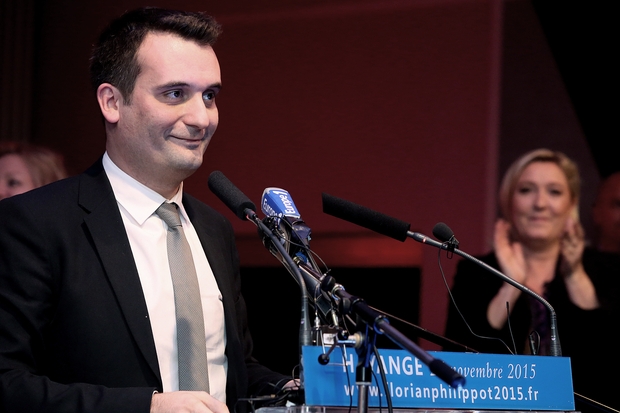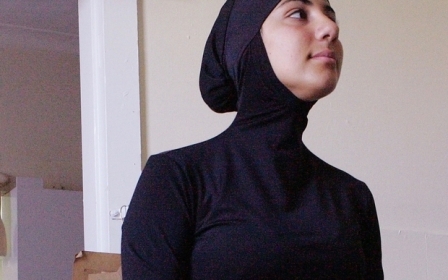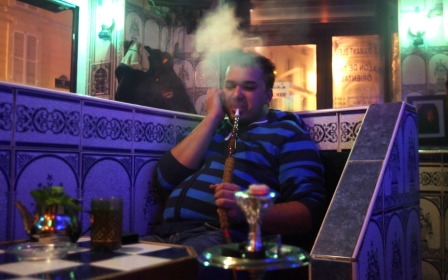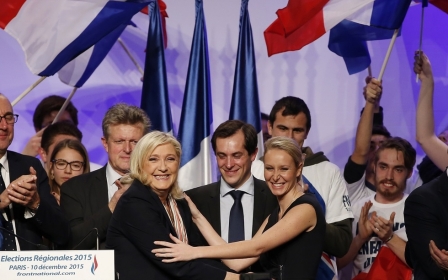France must fight Islamism to restore civil peace, says National Front

Florian Philippot has focused on carefully polishing the image of the French National Front party, moving away from the vision and rhetoric of founder Jean-Marie Le Pen, a serial holocaust denier who has been convicted of racism and inciting racial hatred.
Philippot will become a key player during the 2017 elections, and even more so if current leader Marine Le Pen is elected president next year - a possibility rather than a fantasy in a France of terrorist attacks, high unemployment and a surging right-wing in politics.
And in a post-Brexit Europe, the 35-year-old is clear: for France to improve, it must reaffirm the state’s full sovereignty, just like the UK.
Middle East Eye speaks to Le Pen's right-hand man.
What lessons do you draw from Brexit? You estimated it would not have any economic consequences, however the pound has plummeted and the City’s ranking as first European stock exchange seems to be threatened.
Apocalyptic predictions were made before the vote to scare the British people. Following Brexit, we tried to make Europeans believe that Britain regretted its vote, and that the whole thing was a disaster. True, sterling has declined. However, according to the IMF, it was over-valued anyway. This drop is nothing but good news for the UK. At least now its currency is fairly valued and suits its economy.
Brexit was positive on exports, and tourism into the UK. I have also observed a decrease in the unemployment rate, the consumer confidence index has not been so high in ages, industrial production has increased and the London Stock Exchange is at its best level in years, despite its small fall following Brexit.
The UK’s current situation is way better than France’s or any other eurozone country for that matter. The apocalypse that was predicted did not happen. On the contrary, the British government, led by Theresa May, seems to be so devoted and has just announced a very ambitious re-industrialisation plan. A new course has been set, and things seem to be going well, much to the discontent of the pro-Europeans.
If Marine Le Pen is elected president, what would the Frexit (France leaving the EU) look like?
She will immediately go to Brussels and make the French people’s demands, since she would have been elected for this reason. We will claim back the four pillars of our sovereignty: territorial sovereignty, which means the control of our borders; monetary sovereignty, which means having our own currency; budgetary sovereignty; and last but not least, legislative sovereignty, meaning that our laws, French laws, become superior to the European directives and to the EU laws.
There will be then two hypotheses: either we get what we ask for and we will remain within, not the European Union, but a union deeply reformed, transformed into a Europe of nations, a Europe based on cooperation between free countries, as Charles de Gaulle once proposed. Or, the EU will not adjust. In that case, six months after her election, Marine Le Pen will set up a referendum on whether France should remain in the EU. French people will have the opportunity to vote for the Frexit and we will have our independence back.
In case France votes against the Frexit, Marine Le Pen would face public disapproval, would she draw the right conclusion and resign?
If the EU does not want to adjust and if France refuses to leave the EU, then Marine Le Pen would not stay in power. She said so herself. She is consistent. She would have been elected based on a campaign that aims to control immigration, to re-industrialise the country, in favour of economic patriotism and independence. Implementing those measures will become impossible if the EU prevents her from doing so every day.
To be honest, I don’t think this is a scenario likely to happen as French people are consistent. If they vote for Marine Le Pen, they will do it because they agree with her campaign. They will reaffirm it through the referendum if necessary, which, probably will show an even more overwhelming majority in favour of her programme.
You are considered as the principal architect revitalising the National Front's image. Don’t you think there are still a couple of fails in this strategy? Namely, internal disagreements about issues such as same-sex marriage.
The media are the ones who have created this image... about same-sex marriage, we have voted unanimously a motion at the political bureau. We are in favour for a substitute law, an improved version of the civil solidarity pact, with no civil union needed.
Well, you can still try to find disagreements among us, but disagreements are everywhere: among the Republicans, the Socialists and the government itself, where you won’t even find more than two people who actually agree on something. At least in our party, we are united behind one leader only, Marine Le Pen.
Why does the NF refuse to be called a "far-right” party? Moreover, Marine Le Pen was careful not to mention, not even once, the name “National Front” in a recent speech in Frejus. Is there a will to erase a particular vocabulary?
We have never wanted to be called a “far-right” party. It’s an insult. Being a “far-right” party means denying democracy, denying the republic. It reduces us to a racist vision which is not ours, We are way more pro-democracy since we want more referendums and a voting system like they have in Switzerland. The party wants France to get its sovereignty back. We are patriotic. I think this is the correct term that should be used to qualify us and our party.
True, Le Pen did not mention the name in the Frejus speech, this is normal. The presidential election in the Fifth Republic is not a matter of political parties. It’s more about a relationship between a candidate, here Marine Le Pen, and the French people. It’s a direct line above all political parties, above their internal affairs. It’s more complicated to understand these days because the primaries (like the ones organised by the Republicans) have put the political parties in the spotlight. But we don’t organise such a vote, we have kept the spirit of the Fifth Republic.
The National Front has built its identity around the idea of being “against”: against the elites, against the left-right division, against immigration. However other politicians are using the same ideas. Are you being overtaken, on your “far-right side”, by other political parties?
The party is built around the idea of “being for”: for France, for the French people. It is very positive. It is old news having candidates who, when campaigning, imitate the National Front by using wording and expressions that sound like ours. They have been using the same tricks for the past 15 years.
French people are no longer misled. It doesn’t sound real, genuine. When Emmanuel Macron (former economic minister) says that “he is outside of the system”, he is not credible at all. There’s no one who is more “within the system” than he is. He used to work for the Rothschild investment bank, he was minister of finance for two years and a half. He shares the system’s vision, ultra-European, ultra-liberal. French people are going to reject this “marketing way” of doing politics and are going to look for genuine, sincere and consistent solutions that we are bringing forth.
When it comes to its economic programme, where does the National Front hesitate between liberalism and protectionism, even a kind of ‘Colbertism’, meaning that the state keeps intervening in the economy? More broadly, do you believe you will get support from economic actors? The MEDEF (‘Movement of the Enterprises of France’), which represents the interests of French employers, did not invite the NF to its summer gathering.
Our programme is quite simple: not statism, nor liberalism, but a bit of both. The state has to be strategic: it has to protect strategic sectors, to protect them from international unfair trading, to deal with a more suitable currency for its economy, to promote the "made in France" thanks to protectionism laws. But at the same time, this strategic state has to encourage small businesses. There is no contradiction here. This programme will only be doable if France gets its sovereignty back, its economic borders, and its currency. It would be doable also only with a French economical patriotism, currently forbidden by EU laws.
The National Front slogan is "A more relaxed France”. However, public opinion has become heated with all those identity issues that have been going on. How would the party maintain social peace if it runs the country?
Making sure that France is "soothed" is very important to us. We believe that if there have been so many tensions in France, and that is just as true for social tensions, it’s because we have been too permissive and community-centred. We have let things go astray: women are being left aside, gangs are taking control over some areas, Islamism is taking over the Republican laws, and delinquency is soaring. All of them are bad seeds that can grow to confrontation.
We will get to that “quiet place” only if we use our authority. We also have to reject communitarianism and focus on assimilation. We have to reject the economic war that turns people against each other. We have to reject carrying out unreasonable foreign policy, such as bombing Libya, or almost bombing Syria... what we do is nonsense. We blindly followed Washington. On the contrary, we have to be independent, free. We have to open the dialogue when it comes to foreign affairs instead of systematically going to war. This is what we call “a relaxed France”.
The presidential campaign slogan is to be “In the name of the people”. But who is part of the “people”?
All French people are “the people”. There is no other criteria except for having the French nationality. Why did we pick this slogan? Our Republic says that the people are the only sovereign. However, it is not listened to any more: our last referendum was 11 years ago. It was on the European Constitution, but the result of the voting got trampled by Nicolas Sarkozy, since he passed the law anyway under the Lisbon Treaty. France is still not fully a democracy. For that a party-list proportional system is required, where every single party would be represented.
“In the name of the people” means as well that we no longer want the EU commissioners, under lobbies’ pressure, or Washington’s or NATO’s for that matter, to decide for France. “In the name of the people” is more than a slogan, it’s a mission statement.
How are you going to deal with Muslims in France or French Muslims and what type of relationship the state will have with them?
First of all, I don’t talk about Muslims in France but I talk about French Muslims. We don’t tell the difference between French people based on their religious or non-religious beliefs. We tell them: “All of you are French. All of you have the same rights and obligations. We ask all of you to put the law of the republic above your religious laws. And if some of them go against that, well, they will have to follow the law since no one can go against the law.
Many of our Muslim fellow countrymen expect from us to fight Islamism. They need it, like everybody else in France, in order to reinstate a civil peace. Many Muslim women are telling us they don’t necessary want to wear the hijab. This freedom is no longer in some areas where Islamism prevails. I say Islamists and don’t confuse them with French Muslims.
Isn’t "nation first", a cornerstone of your programme, directly opposed to the principle of equality which is a constitutional principle?
The principle of equality is applied among French people. For instance, only French people can be civil servants. When we talk about national priority, especially when it comes to jobs and low-income housing, we mean that those are reserved for people who have French nationality, and that is the only criteria that matters. You have to note as well, that this is not an exclusivity, meaning that those privileges would be first attributed to French people, but foreigners would also have access to them. For a job position, with equal skills, a French person will be more likely hired than a foreigner. The constitution is applied first to French people.
Last summer, you paid tribute to the left-wing “Popular Front”. You claim De Gaulle’s republican ideas. Your ideological references go beyond the usual ones of the National Front. Don’t you think there is a risk of confusion or dilution of your message?
I don’t think so. We keep on scoring in opinion polls and elections because our message gets clearer and clearer. For instance, when I mentioned the Popular Front, I was not saying that the National Front was a direct heir of it. Socialists in our country are not its heirs either, since they have destroyed everything that the Front had built, especially the idea of a social progress and have replaced it with the EU. We defend a more social vision. We do believe that it’s not necessary and inevitable to demolish all hard-won social gains of the past. This is why I think that there are more ideological similarities between the Popular Front and the National Front than between the Popular Front and today’s Socialism.
In the same way, General De Gaulle represents this national independence. Would he have accepted that France would lose all its control? Its borders, its currency, its budget? The man who represents “Free France” would not have sold France’s sovereignty. The ideas he was defending are the same we are rooting for today.
Interview by Hassina Mechaï and Esther Thwadi-Yimbu
Hassina Mechaï is a French-Algerian journalist based in Paris. She holds a Masters Degree in Law and one in International Relations and is specialised in Africa and Middle East affairs. Her topics of reflexion are world governance, civil society and public opinion, and media and cultural soft power. She has worked for various French, African and Arab media, including Le Point, RFI, Afrique Magazine, Africa 24, Al Qarra, and Respect Magazine.
Esther Thwadi-Yimbu is a French journalist based in Paris. She graduated in journalism and English and French speaking African literatures. She is a specialist in Africa. She has worked for several media: print press such as Le Parisien, France Soir, and TV channels such as My-tivi, Africa 24 and Al Qarra TV. All cultural, society, environment and health issues are her subjects of choice.
This article was originally published on Middle East Eye's French website and translated by Nassima Demiche.
New MEE newsletter: Jerusalem Dispatch
Sign up to get the latest insights and analysis on Israel-Palestine, alongside Turkey Unpacked and other MEE newsletters
Middle East Eye delivers independent and unrivalled coverage and analysis of the Middle East, North Africa and beyond. To learn more about republishing this content and the associated fees, please fill out this form. More about MEE can be found here.




